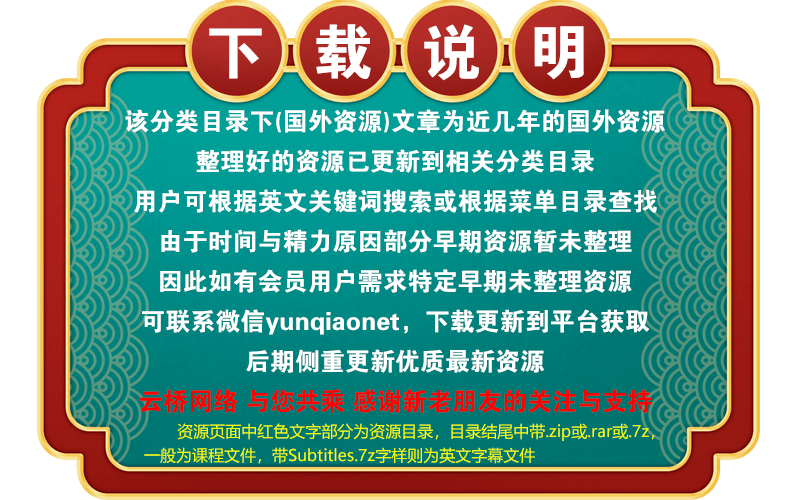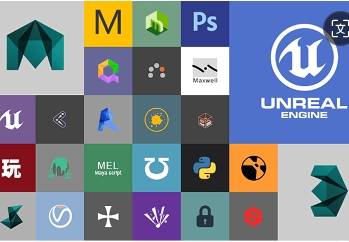Release date:2019, July
Author: Ben Tristem, Michael Bridges, GameDev.tv by Ben Tristem
Skill level:Beginner
Language:English
Exercise files:Yes
What Will I Learn?
Use Blender and understand it’s interface
Understand the principles of modelling
Create 3D models with simple colors
Learn the basics of animation
Explore and have fun with particle effects
Create your own materials
UV map and unwrap your models
Export your models to external packages
Use Blender’s physics engine to create destruction
Combine CGI with real life footageRequirements Mac or PC capable of Running Blender Version 2.77 or above
Description
**THE COURSE IS CURRENTLY BEING UPDATED TO BLENDER 2.8**
We are busy updating the course for 2.8 and including many student suggestions. We are really excited and hope you are as well!
This course is continually updated in response to student suggestions
Blender is a fantastic platform which enables you to make AAA-quality models which can be exported to any game engine, 3D printer, or other software. Here are some of the reasons why you want to learn Blender with this online tutorial…
Create assets for video games.
Make unique 3D printed gifts.
Design your dream house, car, etc
Express yourself through 3D artwork.
Learn how to create 3D Models and Assets for games using Blender, the free-to-use 3D production suite. We start super simple so you’ll be ok with little or no experience. With our online tutorials, you’ll be amazed what you can achieve.
Ben Tristem is one of Udemy’s top instructors, and Michael Bridges is an experienced 3D artist. Together Ben and Michael will provide world-class support, encouragement and plenty of challenges.
The course is project-based, so you will applying your new skills immediately to real 3D models. All the project files will be included, as well as additional references and resources – you’ll never get stuck. There are talking-head videos, powerful diagrams, quality screencasts and more.For each of the models that you build you will follow this process…
Be challenged to build the entire model yourself.
Be shown step-by-step how to build it.
Apply your knowledge regularly.Have a more specific focus? Check out our other Blender courses which focus on characters and environments. Want to bring your models to life in a video game engine? Check out our Complete Unity Developer 3D course. Just look for our green leaf logo – a sign of passion & quality.
You will get full lifetime access for a single one-off fee. The creators are qualified and experienced with modelling and coding, so are able to explain complex concepts clearly, as well as entertain along the way. By the end of the course, you’ll be very confident in the basics of 3D modelling and rendering, and hungry to learn more.
If you’re a complete beginner, we’ll teach you all the modelling fundamentals you’ll need. If you’re an artist, we’ll teach you to bring your assets to life. If you’re a coder, we’ll teach you modelling and design principles.
Note: access to this course comes with an optional, free community site where you can share games and 3D models, as well as connect with other students.
Dive in now, you won’t be disappointed!
Who is the target audience?
Competent and confident with using a computer.
Artists who want to learn to bring their assets alive.
Game Developers who wish to expand their Skill Set.
Complete beginners who are willing to work hard.01. Introduction and Setup 01. Promo Video & Model List 02. Welcome to The Course 03. Whats Coming up… 04. How To Install Blender 05. Where to Find Support 06. Blender Layout Overview 07. Advanced Layout Control 09. Control Interfaces 10. Controlling The 3D Editor 11. Selecting and Taking Action 12. Basic Object Transformation 14. What You Can Now Make 15. Quick Win Moving Around Your Model 16. Section 1 Wrap Up
02. Your First 3D Model in Blender 01. Section 2 Introduction 03. Basic Modelling Concepts 04. Vertices, Edges and Faces 05. Making A Wedge Shape 06. Moving, Rotating and Resizing 07. Pivot Points 08. Duplication and Merging 09. Version Control 10. Merging Vertices in Blender 11. What Are Normals 12. Normals in Blender 14. Extruding In Blender 15. Insetting in Blender 16. Edge Loops, Loop Cut and Slide 17. Different Selection Methods 18. The Snapping Tool 19. Extra Challenge- Railings 20. Using The Array Modifier 21. Loop Cuts and Face Loops 22. Subdivision 23. Coordinate Systems & Exporting 24. Applying Transforms 26. Extra Modelling Challenges 27. Section 2 Wrap Up
03. Bowling Ball and Pins 01. Section 3 Introduction 02. Lean Production Pipeline 03. Knowing Your Topic and Specification 04. Blender Model Scale 05. Importing Reference Material 06. Introduction to Bézier Curves 08. Spin In Blender (Rotational Extrusion) 09. Assigning Materials To Faces 10. Exporting Models With Materials 11. Creating Collider Meshes 12. Choosing The Right Sphere 13. Subdividing an Edge and To Sphere 14. Extruding to a Normal 15. Importing Blender Files 16. Final Scene 18. Fun With Physics 19. Section 3 Wrap Up
04. Low-Poly Chess Board & Pieces 01. Section 4 Introduction 03. Managing A Larger Project 04. Planning Our Project 05. Mesh Objects And Mesh Data 06. Re-centring Your Objects 07. Creating A Standard Asset 08. Using The Bevel Tool 09. Appending Or Duplicating 10. Bridging Edge Loops 11. Finish the Low Poly Pawn 12. Managing The Chess Scene Assets 13. The 3D Cursor and Origins 14. Using Common Features 15. Selecting Hidden Geometry 16. Boolean Modifier 18. An Introduction To Empties In Blender 19. Parent and Child Objects 20. Zoom To Mouse & Rotate Around Selection 21. Lighting in Blender Render 22. Hiding Un-Needed Objects. 23. Diffuse and Specular Blender Render 24. Using An Image As A Texture 25. Using Procedural Textures 26. Quads Vs Triangles and Ngons 27. Non Planar Geometry 28. Edge Rings 29. The Mirror Modifier 30. The Edge Split Modifier 31. Modelling Challenge – Rook 32. Modelling Challenge – King 33. Setting Up A Camera For Rendering 34. Exporting Your Chess Model 36. End of Section 4
05. An Animated Lamp 01. Section 5 Introduction 03. Being Lean 04. Cycles VS Blender Render 05. Dedicated Graphics Cards 06. Installing CUDA On Windows 07. Installing CUDA On A Mac 08. Setup Blender For GPU Rending 09. Lowering Your Cycles Render Time 10. Creating A Backdrop 11. Lighting With Cycles 12. Rendering A Small Area 13. Using Curves To Generate Geometry 14. Creating Geometry From A Curve 15. Altering Curve Resolution 16. Existing Geometry To Create New 17. Design and Considerations 18. Introduction to Armatures 19. Revisiting the Mirror Modifier 20. Adding Bones To Our Armature 22. Pose Mode 23. Rest Position and Pose Position 24. Constraining Bones Movement 25. The Solidify Modifier 26. Introduction To The Node Editor 27. Lamps vs Emissive Materials In Cycles 28. Auto Inverse Kinematics (IK) 29. The Timeline 30. Key Frames 31. Setting Up The Camera 31.2 AL31 Setting Up The Camera 32. Rendering An Animation 33. Rendering Across Multiple Blenders 34. Creating A Video of Your Animation 35. Exporting Your Lamp Model 36. Vertex Groups 37. Re-Rigging Our Model 38. Exporting The Final Model 40. End of Section 5 Wrap Up
06. Fluffy Bunny 01. Section 6 Introduction 03. Planning Our Scene 04. Knowing Your Subject 05. Layers 06. Meta Balls 07. The Basics Of Sculpting 08. Basic Sculpting Solution Video 09. GPU Rendering In This Section 10. Your First Particle System 11. Fake Users 12. Particle Editing 13. Weight Painting 14. Adding Randomness with Children 15. Multiple Cameras 16. Exporting and Particle Systems 17. Hiding Objects 18. Introduction To The Image Editor 19. Combining Shaders In Cycles 20. UV Unwrapping and Texture Mapping 21. Adding a Sky Box 23. Using Textures Vs. Geometry 24. Importing Images As Planes 25. Packing External Data 26. Node Type Overview 27. Textures With Transparency 28. Textures Without Transparency 29. Testing The Grass 30. Light Path Render Settings 31. Making Textures Look More 3D 32. Using Objects With Particle Systems 33. Layering Particles Systems in Blender 34. Introduction to Sapling 35. Using Sapling To Make A Basic Tree 37. End of Section 6 Wrap Up
07. Game Asset Pack (Ref GAP_CBC) 01. Section 7 Introduction 02. Section Specification 03. Planning Your Project 04. Version Control 2 05. File Structure & Naming 06. Level Of Detail (LOD) 07. Building Blocks 08. Setting Up Our Repo & Committing 09. Repetitive Tasks In Blender 10. Using Our Building Blocks 11. Introduction To Datablocks 12. Linking To An External Datablock 13. Linking Blend Files- Making a Proxy 14. Linking Blend Files Making Local 16. Walking And Flying Around The Model 17. Better Camera Control 18. What Can You Export 19. Re-linking Blend Files 20. Profile Modelling By Extrusion 21. Profile Modelling Using Curves 22. Profile Modelling Using Mesh Objects 23. Light Portals 24. Using Source Control- Resetting 25. Introduction To UV Unwrapping 26. Smart UV Project 27. How Is It Coming Together 28. Adding More Detail 29. Problem Solving 30. UV Manipulation 31. Complex Shapes & UV Mapping 32. Introduction To Marking Seams 33. Painting In The Image Editor 35. Diffuse Maps 36. Using Images For Control 37. Illusion of Detail- Using Bump Maps 38. Using Displacement Maps 39. Normal Maps 40. Baking A Normal Map In Blender 41. Applying A Normal Map In Blender 42. Texture Resolution 43. The Multi-Resolution Modifier 45. Baking Using The Multires Modifier 46. Copying Mesh Properties 47. Optimising A UV Map 48. Texture Painting In The ViewPort 49. Realistic Lighting Or Fake It 50. Creating a New Scene In Blender 52. Section 7 Wrap Up
08. The Human Head 01. Section 8 Introduction 02. Section 8 Reference Material 03. Good Mesh Topology 04. Possible Construction Methods 05. Introduction To Retopology 06. Creating The Base Mesh 07. The Grease Pencil 08. The Knife Tool 09. Rip and Rip Fill 10. Vertex Slide and Edge Slide 11. Routing Face Loops Using Poles 12. Defining A Faces Main Face Loops 13. Getting The Right Skin Tone 14. 3 Point Lighting 15. Subsurface Scattering 17. The Layer Weight Node 18. Physics Based Rendering (PBR) 19. The Color Ramp Node 20. How Light Interacts With A Surface 21. The Fresnel Node 22. Reusing Shaders And Materials 23. The MixRGB Node 24. The Geometry Node 25. Hue Saturation Value (HSV) 26. Making Objects Separately 27. Joining Separate Objects 28. Adding Detail with Sculpting 29. UV Unwrapping A Head 30. Texturing The Head 31. Reviewing Your Work Objectively 33. Section 8 Wrap Up
09. BONUS Destruction (Ref DD_CBC) 01. Section 9 Introduction 02. Welcome to Destruction 03. Quick Explode 04. Introduction To Blender Physics 05. Copying Physics Properties 06. Centre Of Mass 07. Animating With Physics 08. Breaking Up A Model Using Particles 09. Force Fields And Particles 10. Force Fields And Other Objects 11. Cell Fracture Add-On 12. Fracturing With A Child Object 13. Fracturing With The Grease Pencil 14. Animating Render Layers 16. Destruction Wrap Up
10. Bonus VFX and CGI 01. Introduction to VFX & CGI 02. Video Effects (VFX) 03. Good Source Material 04. Introduction to Compositing 05. Matching Camera Settings 06. Mathematics And Images 07. Overlaying Images 08. Extracting Image Data 09. Blender Camera Tracking Footage 10. Blender Camera Tracking Markers 11. Solving Camera Motion 12. CGI VFX Final Scene 13. Transparent Backgrounds 15. VFX and CGI Wrap Up
11. Continuing Your GameDev Journey 02. What Next 03. Blender Resources 05. Credits
Media Files
01.1 1080 Drone Footage
1080 Drone Footage
1080 Airfield 1080 Field 1080 M11 FootBridge 1080 Science Park01.3 Airfield Cut
Airfield Cut
8s Airfield 1080p 8s Airfield 4k 8s Airfield 540p 8s Airfield 720p01.5 4k Drone Footage
4k Drone Footage
4K Airfield 4K Field 4K M11 FootBridge 4K Science Park01.7 720 Drone Footage
720 Drone Footage
720 Airfield 720 Field 720 M11 FootBridge 720 Science ParkLearn 3D Modelling – The Complete Blender Creator Course (Updated) – Files.7z
 Channel and
Channel and  Group
Group
1、登录后,打赏30元成为VIP会员,全站资源免费获取!
2、资源默认为百度网盘链接,请用浏览器打开输入提取码不要有多余空格,如无法获取 请联系微信 yunqiaonet 补发。
3、分卷压缩包资源 需全部下载后解压第一个压缩包即可,下载过程不要强制中断 建议用winrar解压或360解压缩软件解压!
4、云桥网络平台所发布资源仅供用户自学自用,用户需以学习为目的,按需下载,严禁批量采集搬运共享资源等行为,望知悉!!!
5、云桥网络-CG数字艺术学习与资源分享平台,感谢您的赞赏与支持!平台所收取打赏费用仅作为平台服务器租赁及人员维护资金 费用不为素材本身费用,望理解知悉!



评论(0)